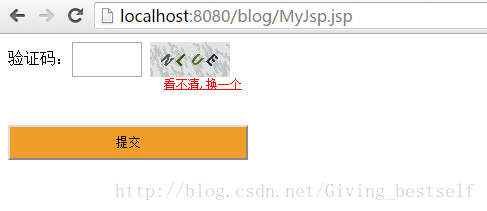隨機生成四位數驗證碼,包括漢字,數字,英文大小寫。
1.Servlet類
package servlet;
import java.awt.BasicStroke;
import java.awt.Color;
import java.awt.Font;
import java.awt.Graphics;
import java.awt.Graphics2D;
import java.awt.geom.AffineTransform;
import java.awt.geom.Line2D;
import java.awt.image.BufferedImage;
import java.io.IOException;
import java.io.PrintWriter;
import java.util.Random;
import javax.imageio.ImageIO;
import javax.servlet.ServletException;
import javax.servlet.http.HttpServlet;
import javax.servlet.http.HttpServletRequest;
import javax.servlet.http.HttpServletResponse;
import javax.servlet.http.HttpSession;
public class PictureCheckCode extends HttpServlet {
private static final long serialVersionUID = 1L;
public PictureCheckCode() {
super();
}
public void destroy() {
super.destroy();
}
public void init() throws ServletException {
super.init();
}
/*該方法主要作用是獲得隨機生成的顏色*/
public Color getRandColor(int s,int e){
Random random=new Random ();
if(s>255) s=255;
if(e>255) e=255;
int r,g,b;
r=s+random.nextInt(e-s); //隨機生成RGB顏色中的r值
g=s+random.nextInt(e-s); //隨機生成RGB顏色中的g值
b=s+random.nextInt(e-s); //隨機生成RGB顏色中的b值
return new Color(r,g,b);
}
public void doGet(HttpServletRequest request, HttpServletResponse response)
throws ServletException, IOException {
System.out.println("this is doGet method");
this.doPost(request, response);
}
public void doPost(HttpServletRequest request, HttpServletResponse response)
throws ServletException, IOException {
//設置不緩存圖片
response.setHeader("Pragma", "No-cache");
response.setHeader("Cache-Control", "No-cache");
response.setDateHeader("Expires", 0);
//指定生成的響應圖片,一定不能缺少這句話,否則錯誤.
response.setContentType("image/jpeg");
int width=80,height=35; //指定生成驗證碼的寬度和高度
BufferedImage image=new BufferedImage(width,height,BufferedImage.TYPE_INT_RGB); //創建BufferedImage對象,其作用相當於一圖片
Graphics g=image.getGraphics(); //創建Graphics對象,其作用相當於畫筆
Graphics2D g2d=(Graphics2D)g; //創建Grapchics2D對象
Random random=new Random();
Font mfont=new Font("楷體",Font.BOLD,16); //定義字體樣式
g.setColor(getRandColor(200,250));
g.fillRect(0, 0, width, height); //繪制背景
g.setFont(mfont); //設置字體
g.setColor(getRandColor(180,200));
//繪制100條顏色和位置全部為隨機產生的線條,該線條為2f
for(int i=0;i<100;i++){
int x=random.nextInt(width-1);
int y=random.nextInt(height-1);
int x1=random.nextInt(6)+1;
int y1=random.nextInt(12)+1;
BasicStroke bs=new BasicStroke(2f,BasicStroke.CAP_BUTT,BasicStroke.JOIN_BEVEL); //定制線條樣式
Line2D line=new Line2D.Double(x,y,x+x1,y+y1);
g2d.setStroke(bs);
g2d.draw(line); //繪制直線
}
//輸出由英文,數字,和中文隨機組成的驗證文字,具體的組合方式根據生成隨機數確定。
String sRand="";
String ctmp="";
int itmp=0;
//制定輸出的驗證碼為四位
for(int i=0;i<4;i++){
switch(random.nextInt(3)){
case 1: //生成A-Z的字母
itmp=random.nextInt(26)+65;
ctmp=String.valueOf((char)itmp);
break;
case 2: //生成漢字
String[] rBase={"0","1","2","3","4","5","6","7","8","9","a","b","c","d","e","f"};
//生成第一位區碼
int r1=random.nextInt(3)+11;
String str_r1=rBase[r1];
//生成第二位區碼
int r2;
if(r1==13){
r2=random.nextInt(7);
}else{
r2=random.nextInt(16);
}
String str_r2=rBase[r2];
//生成第一位位碼
int r3=random.nextInt(6)+10;
String str_r3=rBase[r3];
//生成第二位位碼
int r4;
if(r3==10){
r4=random.nextInt(15)+1;
}else if(r3==15){
r4=random.nextInt(15);
}else{
r4=random.nextInt(16);
}
String str_r4=rBase[r4];
//將生成的機內碼轉換為漢字
byte[] bytes=new byte[2];
//將生成的區碼保存到字節數組的第一個元素中
String str_12=str_r1+str_r2;
int tempLow=Integer.parseInt(str_12, 16);
bytes[0]=(byte) tempLow;
//將生成的位碼保存到字節數組的第二個元素中
String str_34=str_r3+str_r4;
int tempHigh=Integer.parseInt(str_34, 16);
bytes[1]=(byte)tempHigh;
ctmp=new String(bytes);
break;
default:
itmp=random.nextInt(10)+48;
ctmp=String.valueOf((char)itmp);
break;
}
sRand+=ctmp;
Color color=new Color(20+random.nextInt(110),20+random.nextInt(110),random.nextInt(110));
g.setColor(color);
//將生成的隨機數進行隨機縮放並旋轉制定角度 PS.建議不要對文字進行縮放與旋轉,因為這樣圖片可能不正常顯示
/*將文字旋轉制定角度*/
Graphics2D g2d_word=(Graphics2D)g;
AffineTransform trans=new AffineTransform();
trans.rotate((45)*3.14/180,15*i+8,7);
/*縮放文字*/
float scaleSize=random.nextFloat()+0.8f;
if(scaleSize>1f) scaleSize=1f;
trans.scale(scaleSize, scaleSize);
g2d_word.setTransform(trans);
g.drawString(ctmp, 15*i+18, 14);
}
HttpSession session=request.getSession(true);
session.setAttribute("randCheckCode", sRand);
System.out.println(sRand);
g.dispose(); //釋放g所占用的系統資源
ImageIO.write(image,"JPEG",response.getOutputStream()); //輸出圖片
}
}
2.web.xml配置
<servlet> <description>This is the description of my J2EE component</description> <display-name>This is the display name of my J2EE component</display-name> <servlet-name>PictureCheckCode</servlet-name> <servlet-class>servlet.PictureCheckCode</servlet-class> </servlet> <servlet-mapping> <servlet-name>PictureCheckCode</servlet-name> <url-pattern>/pictureCheckCode</url-pattern> </servlet-mapping>
3.jsp頁面輸出驗證碼
<%@ page language="java" import="java.util.*" pageEncoding="utf-8"%>
<!DOCTYPE HTML PUBLIC "-//W3C//DTD HTML 4.01 Transitional//EN">
<html>
<head>
<title>登錄頁面</title>
<meta http-equiv="pragma" content="no-cache">
<meta http-equiv="cache-control" content="no-cache">
<meta http-equiv="expires" content="0">
<meta http-equiv="keywords" content="keyword1,keyword2,keyword3">
<meta http-equiv="description" content="This is my page">
<script language="javascript">
function myReload() {
document.getElementById("CreateCheckCode").src = document
.getElementById("CreateCheckCode").src
+ "?nocache=" + new Date().getTime();
}
</script>
</head>
<body>
<form action="loginServlet" method="get">
<p class="font tdheight">
驗證碼:<input type="text" name="checkCode"
> <img
src="pictureCheckCode" id="CreateCheckCode" align="middle"
> <br> <a href=""
onclick="myReload()"
> 看不清,換一個</a>
</p>
<br><input type="submit" value="提交"
class="font" >
</form>
</body>
</html>
4.後台Servlet判斷驗證碼是否與輸入一致
通過request.getParameter(“checkCode”)獲取輸入驗證碼,與session.getAttribute(“randCheckCode”)比較是否一致。
public void doGet(HttpServletRequest request, HttpServletResponse response)
throws ServletException, IOException {
String code = request.getParameter("checkCode");
HttpSession session = request.getSession();
if (!code.equals(session.getAttribute("randCheckCode"))) {
request.setAttribute("errormsg", "驗證碼不正確");
}
System.out.println(request.getAttribute("errormsg"));
}
運行結果:

以上就是本文的全部內容,希望對大家的學習有所幫助,也希望大家多多支持。